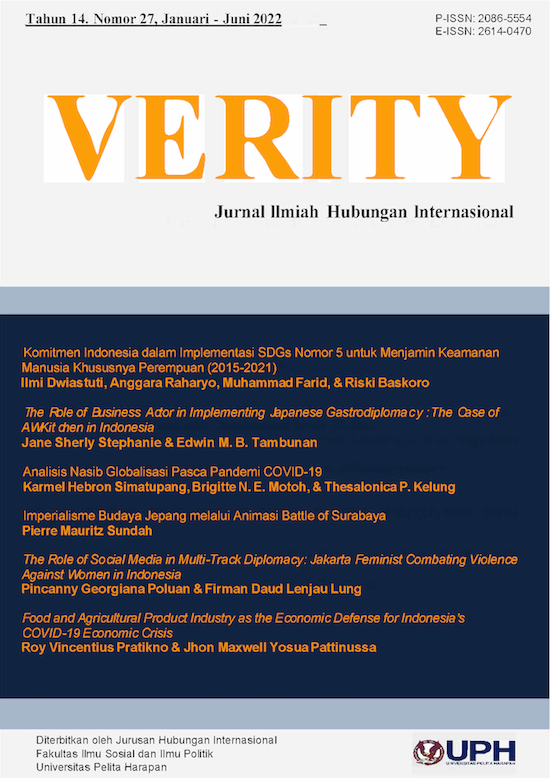The Role of Business Actor in Implementing Japanese Gastrodiplomacy: The Case of AWKitchen Restaurant in Indonesia [Peran Aktor Bisnis dalam Menerapkan Gastrodiplomacy: Studi Kasus Restoran AWKitchen di Indonesia]
DOI:
https://doi.org/10.19166/verity.v14i27.5910Keywords:
Gastrodiplomacy, Globalization, Soft Power, Business Actor, Japan-IndonesiaAbstract
Business actors as one of the non-state actors play a role in implementing a country's foreign policy, especially in introducing a national image or identity through public diplomacy, which is known as gastrodiplomacy. This article aims to identify and examine the role of a fusion cuisine restaurant in carrying out Japanese gastrodiplomacy in Indonesia. The article is developed from qualitative research applying a case study method. Based on data collecting from interviews, observations, and library research, the Japanese restaurant under investigation is not just a business actor serving fusion cuisine in Indonesia. The restaurant has contributed to showing the positive side of globalization or taming westernization, and its business activities can be categorized as unrecognized gastrodiplomacy. The restaurant has participated in implementing the function of gastrodiplomacy even though without any formal affinity and official recognition from the Japanese government agencies. The fusion cuisine restaurant has succeeded in helping carry out the mission of the Japanese state in introducing its image or identity.
Bahasa Indonesia Abstract: Aktor bisnis sebagai salah satu aktor non-negara memainkan peran dalam mengimplementasikan kebijakan luar negeri suatu negara, terutama dalam memperkenalkan citra nasional atau identitas nasional melalui diplomasi publik, yang sering dikenal sebagai gastrodiplomacy. Artikel ini bertujuan untuk mengenali dan menelaah peran dari restoran dengan hidangan kombinasi dalam menjabarkan gastrodiplomacy Jepang di Indonesia. Artikel ini dikembangkan dengan pendekatan kualitatif yang menerapkan metode studi kasus. Berdasarkan data yang diperoleh dari hasil wawancara, observasi, dan studi kepustakaan, restoran Jepang yang diteliti tidak hanya menjadi aktor bisnis yang bertugas untuk menyajikan hidangan gabungan di Indonesia. Restoran ini sudah berkontribusi untuk menunjukkan sisi positif dari Globalisasi atau mengurangi persepsi buruk Westernisasi, dan aktivitas bisnis restoran tersebut dapat dikategorikan sebagai gastrodiplomacy yang kurang mendapat pengakuan. Restoran ini sudah berpartisipasi dalam implementasi fungsi gastrodiplomacy meskipun tanpa perhatian dan pengakuan resmi dari pemerintah Jepang. Restoran hidangan kombinasi telah berhasil membantu membawa misi Jepang untuk memperkenalkan citra atau identitasnya.
References
Adam, M., Iqbal, M., & Trihartono, A. (2017). Gastrodiplomacy Jepang di Indonesia Melalui Program Japan Halal Food Project (JHFP) Tahun 2013-2015. E-Sospol, 4(1): 12-19. https://jurnal.unej.ac.id/index.php/E-SOS/article/view/5606
Committee for the Promotion of Research on Food Culture. (2005). Promotion of Japanese Food Culture (日本食文化ã®æŽ¨é”²). Retrieved from https://www.eiyo.ac.jp/shokuiku/images/report.pdf
Dewi, P., & Priadarsini, N. (2018). Peran Non-State Actors dalam Gastrodiplomacy Indonesia melalui Ubud Food Festival. Jurnal Ilmiah Hospitality Management, 9(1): 1-16.
Dewi, R. (2019). Gastrodiplomasi Jepang di Indonesia dalam Program Japan Halal Food Project. Jurnal Ilmu Hubungan Internasional Fakultas Ilmu Sosial dan Ilmu Politik Universitas Muhammadiyah Yogyakarta. Retrieved from http://repository.umy.ac.id/bitstream/handle/123456789/28051/J.%20JURNAL%20HI.pdf?sequence=10&isAllowed=y
Dye, F. (2021). What is a Signature Dish? Retrieved from https://www.delightedcooking.com/what-is-a-signature-dish.htm
Fan, Y. (2008). Soft Power: Power of Attraction or Confusion? Place Branding and Public Diplomacy, 4(2): 147-158.
Femina. (2018). Makna Istimewa Signature Dish bagi Seorang Chef. Retrieved from https://www.femina.co.id/food-trend/makna-istimewa-signature-dish-bagi-seorang-chef-
Flammang, J. (2016). Table Talk: Building Democracy One Meal at a Time. Springfield, IL: University of Illinois Press. Retrieved from https://www.jstor.org/stable/10.5406/j.ctt18kcv90.11
Ichijo, A., & Ranta, R. (2016). Food, National Identity and Nationalism: From Everyday to Global Politics. Basingstoke, Hampshire: Palgrave Macmillan.
JBWG (Japan Brand Working Group). (2005). Promotion of Japan Brand Strategy (日本ブランド 戦略ã®æŽ¨é”²). Retrieved from http://www.kantei.go.jp/jp/singi/titeki2/tyousakai/contents/houkoku/050225hontai.pdf
JETRO (Japan External Trade Organization). (n.d.). Ochiai Shuzojyo Co., Ltd.: Bringing Ginger Shochu to the U.S. Retrieved from https://www.jetro.go.jp/en/videos/_447260.html
JRO (Organization to Promote Japanese Restaurants Abroad). (n.d.). Activity Outline. Retrieved from http://jronet.org/about/active/
Ministry of Foreign Affairs. (2019). Promote Indonesian Culinary to the World Through Gastrodiplomacy. Retrieved from https://kemlu.go.id/portal/en/read/688/berita/meningkatkan-promosi-kuliner-indonesia-ke-seluruh-dunia-melalui-gastrodiplomasi
MOFA (Ministry of Foreign Affairs) (2011). Washoku-Try Japan’s Good Food Business. Retrieved from https://www.mofa.go.jp/mofaj/annai/zaigai/washoku/index.html
Putri, A. (2019). Gastrodiplomasi dan Kemajuan Pariwisata Kuliner Peru Tahun 2005-2017. Jurnal Fisip HI Universitas Airlangga. Retrieved from http://repository.unair.ac.id/82032/3/JURNAL_Fis.HI.22%2019%20Put%20g.pdf
Reynolds, C. (2012). The Soft Power of Food: A Diplomacy of Hamburgers and Sushi? Food Studies: An Interdisciplinary Journal, 1(2): 47-60.
Setyanti, C. (2016). Chef Akira Watanabe: Antara Jepang, Perancis, dan Musik Rock, CNN Indonesia. Retrieved from https://www.cnnindonesia.com/gaya-hidup/20160225161227-262-113548/chef-akira-watanabe-antara-jepang-prancis-dan-musik-rock
Simmel, G. (1997). The Sociology of the Meal? In Frisby, D., & Featherstone, M (Eds.), Simmel on Culture: Selected Writings. London: Sage.
Sinaga, A., & Sukandar, R. (2019). Gastrodiplomacy Turki oleh Zahra Turkish Ice Cream di Indonesia. Indonesian Perspective, 4(1): 83-96.
Sonenshine, T., Rockower, P., Chapple-Sokol, S., Weaver, G., & The Conflict Cuisine Project (2016). Is The Kitchen The New Venue Of Foreign Policy?: Ideas On Food As A Tool For Diplomacy, Building Peace And Cultural Awareness (pp. 9-11, Rep.), Stimson Center. Retrieved from http://www.jstor.com/stable/resrep10919.6
Watanabe, Y., & McConnell, D. (2008). Soft Power Superpowers. New York: Routledge.
Published
Issue
Section
License
Authors who publish with this journal agree to the following terms:
1) Authors retain copyright and grant the journal right of first publication with the work simultaneously licensed under a Creative Commons Attribution License (CC-BY-SA 4.0) that allows others to share the work with an acknowledgement of the work's authorship and initial publication in this journal.
2) Authors are able to enter into separate, additional contractual arrangements for the non-exclusive distribution of the journal's published version of the work (e.g., post it to an institutional repository or publish it in a book), with an acknowledgement of its initial publication in this journal.
3) Authors are permitted and encouraged to post their work online (e.g., in institutional repositories or on their website). The final published PDF should be used and bibliographic details that credit the publication in this journal should be included.


